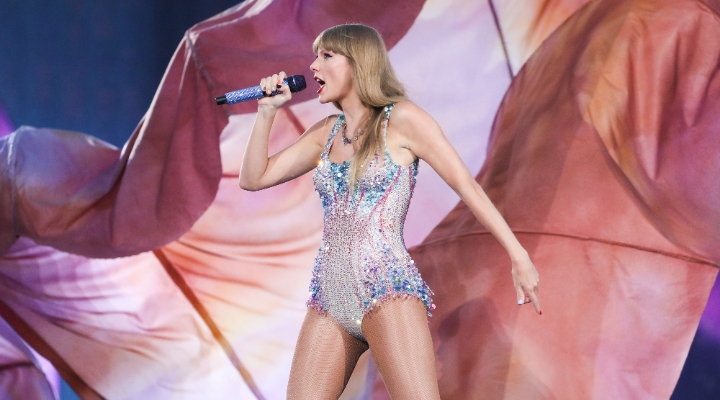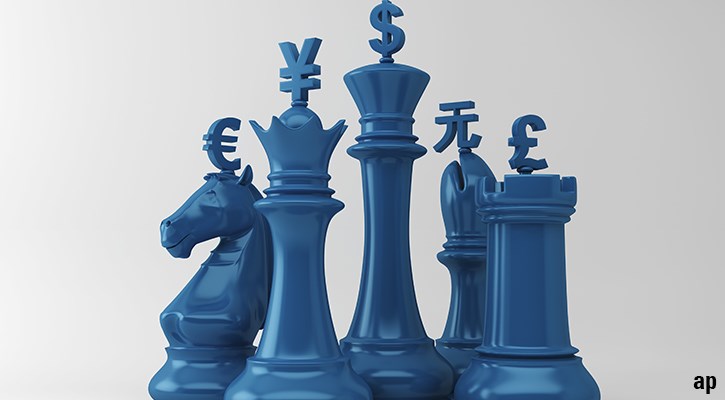
How much would you pay for a Taylor Swift ticket? The popstar’s Eras tour comes to the UK next year and those lucky enough to get tickets will be counting down the months and days.
Fans in North America have already had the experience this summer – to judge by the reaction in Canada at least, they were willing to spend a fortune on the experience. My collleague Carole Hodorowicz has written a great piece on the fan reaction, explaining why they were prepared to pay hundreds if not thousands of dollars on the night.
"I would sell an organ if I had to," one said. Ditto.
As a late convert to Taylor Swift after her collaboration with indie stalwarts The National, I was keen to join the fun, but like most wannabe concert goers I was disappointed. My bank balance will probably thank me. It's been a busy summer for what the Brits call "gigs" – I've been to everything from bands in the pub to Bruce Springsteen at Hyde Park.
'I'm Not Paying That'
My gig-going career goes back many decades. Cumulatively I have spent a lot of money. Mostly it’s been well spent. A concert remains a unique experience to see an act despite ongoing tinnitus, idiots talking through the quiet bits, the ubiquity of fans filming themselves, and the strange cohort of people who see festivals as outdoor eating and drinking experiences. I’m more selective now though.
Given the sadly short lifespan of many artists these days, it’s important to see your heroes while you can. I was lucky enough to see Prince play The O2 in 2007 when he did 21 glorious nights in London. Price: £31.21. How much would I pay to see David Bowie, Nirvana, Jimi Hendrix etc? It’s a great late night drunken conversation with friends.
Never one to miss an opportunity to overthink fun things, I have been wondering what it means in the context of our nation's overstretched finances. Much has been written about the strange phenomenon of fans' willingness to pay huge sums of money in an era of the highest inflation for decades. But I've gone one further and done the maths.
This is some of my personal gig ticket spending over the years.
The first thing to say is that this is discretionary spending. It’s fair and legitimate to criticise the ticketing industry and its sharp practices but ultimately you can say no, whereas rent/mortgage increases and food and energy bills are non-negotiable.
The economic theory of "price elasticity" suggests if prices go up, demand goes down. We’ve seen it with branded consumer goods this year; Unilever said that when it put ice cream prices up, people bought less of it. It’s evident in luxury goods too, which are priced for exclusivity: not many people can afford to fly first class anywhere beyond Europe, but that’s part of the cachet.
"I’m not paying that," is a standard British refrain when we sense that we’re being ripped off. Can this be thrown out of the window with concert tickets? Not necessarily. Concert prices are high in relation to average incomes but they are priced in such a way as to avoid putting off the right number of people. Glastonbury tickets cost £335 this year but the event always sells out. Behind all that is a shadow ticketing industry too, which exploits demand by vastly inflating ticket prices beyond their face value. In 2023, artists respond to this on a scale that features wilful ignorance at one end and interventionary outrage at the other.
The Magic Circle
If you love an artist, can you actually say no? After many years supporting The Rolling Stones on the grounds this might be their last tour, I’ve finally put my credit card away. Not that they’re a bad live act, it’s just I felt that the prices were getting a bit ridiculous for a soulless Row Z arena experience. There’s a notional ceiling on what I’m prepared to spend. I would consider paying for a ticket on a "secondary site" if the markup wasn't too much, but haven’t yet done so. If it’s sold out, I let it rest.
The standard psychology and economics behind the concert price phenomenon make sense. Two years of lockdowns have put a premium on real experiences, the theory goes. All my favourite bands started touring at once last year, which was exciting but costly. Some bands I’ve discovered via streaming services have started touring, which is ironic because this mode of listening forces artists on the road to make a living. So the industry economics favour live shows too. Many bands have come out of retirement or reformed because the financial incentives are now there. Spotify does allow bands to have a weird second or third act, playing to audiences who weren’t alive when the records came out.
And then there's the nostalgia. Britpop fans are now in their 40s or 50s, with more money to spend than millennials. Blur, Suede and Pulp sold out stadiums this summer, with fans eager to relive their youth. Blur charged £20 in 1999 and it's clear they have more commercial clout than they used to so can charge more than inflation increases would suggest. These three acts have also reformed after a number of years out of the limelight, so that helps ignite interest among loyal fans. In the case of Blur and Suede, they have released new and critically acclaimed albums this year so it's clear these are not just "greatest hits" tours.
With Noel and Liam both playing Oasis hits live in 2023, what price a reunion in 2024? Asking for my wife, a Noel Gallagher superfan who went to Knebworth in August 1996 and spent £22.50 on her ticket.
There’s a commercial dynamic to this – the industry doesn’t produce as many headline bands as it used to, so the ones still going can command a premium. How many artists could charge up to £200 a ticket for one night? I can probably count them, and they would include Taylor Swift, Beyoncé, Led Zeppelin, Bruce Springsteen. So mid-ranking acts don’t have the same pricing power. As band members die out, the "magic circle" of elite artists isn’t replenished.
When Will Gig Ticket Inflation Fall?
There’s also the inexplicable element to music fandom; you can make an emotional connection with an artist that skews your thinking. Like being a football fan who pays thousands for a season ticket even though your team is awful and you’re skint, being a music fan requires sacrifice and cost.
If I look at my Bruce Springsteen tickets this summer I now see service charges, handling fees and insurance that weren’t visible in the white heat of the presale. Consumer groups have long lobbied against extras and there’s a long way to go. Going via the venue directly is a new way to go and there are apps like Dice have been successful in thwarting the touts.
Still the might of the "Big Ticket" prevails, and you know who I mean. The industry is still in throes of being disrupted properly but there are entrepreneurs who are fighting the good fight. Perhaps the great concert price escalation will start easing when inflation starts to fall. After all, artists incur logistics, food, staff costs like mere mortals. And maybe the novelty will wear off as the pandemic trauma recedes.
But if anyone does have a spare Taylor Swift ticket, let’s talk hard cash.
Note to the table: Handily my wife and I have two large scrapbooks of physical concert tickets going back to the 1990s – you don’t get that with QR codes – so the nerd in me can go back and inflation link the prices via the Bank of England’s tool. As a methodology, I’ve stripped out extra fees where I can, removed any premium for “VIP” access, and gone for standing tickets as they’re the generally the default and the cheapest. I’ve included this summer’s Pulp and Blur reunion tickets for comparison but I didn’t go. I’ve also compared Oasis and Noel Gallagher tickets but they’re not exactly like for like. In some 2023 cases these are "festival" tickets so are generally more expensive than indoor gigs because you get to see more bands.




























